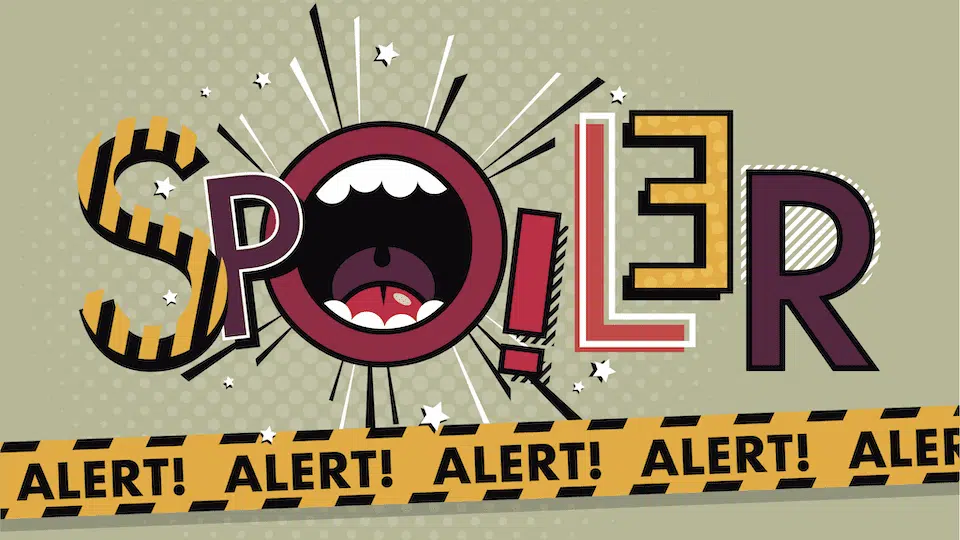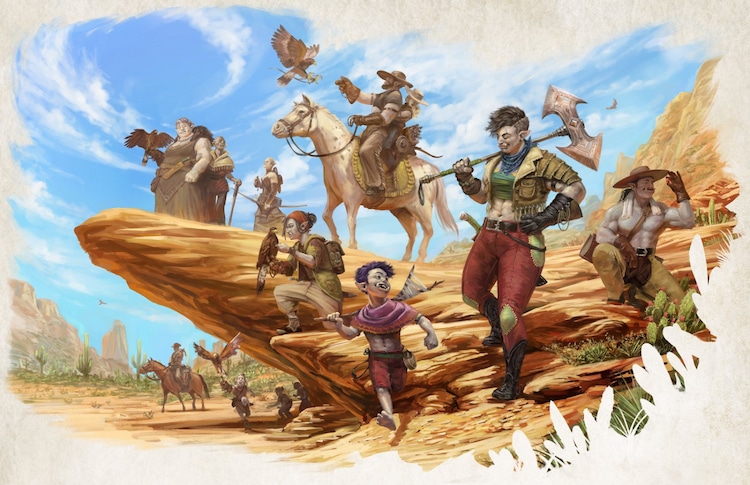
Vader is Luke’s bad guy. Rosebud was the name of a 2-hour long question. From the beginning, Bruce Willis was in the movie the WHOLE time.
We live in a time of SPOILERS everywhere. One of the big questions about it, if you haven’t heard, is “Does knowing the twist of a movie or video game actually ruin the whole story for you? Or was the whole thing only hanging on the twist alone, making the story weak by comparison.” Well, much like buttholes, everyone has an opinion. And I have a butthole because I’m one of those “everyones.” So, let’s explore my… “opinion” in this article, which I’m certain no one asked for.

A woman walks into a room with a glass of wine, sits next to her husband, and says, “I love you so much. I just want you to know that I couldn’t make it without you.” The husband says, “Is that you talking, or the wine?” The woman says, “Neither. It’s me talking to the wine.” (pause for laughter)
This is an example of subverting expectations, otherwise called “the twist.” This twist is what can be “spoiled” for an audience if they know about it before experiencing it.
Let’s science this bitch.
Expectation subversion a commonly-used tool in telling jokes. You set up the story and tell it in a way that forces the audience to logically think of how it’s going to end. By the end of it, you have presented a “twist,” forcing the audience to rethink the story and see it in a new way with new information. In joke-telling, you have to make this new information work without the need to think too long about it. It needs to hit quickly, register fast, and invite the audience to laugh at the jab. The audience laughs not because they were tricked but because they feel rewarded for deciphering the information correctly.
And that’s the word I want you to focus on when it comes to the twist: the REWARD.
Ok, lesson over.
Now my big question: Is giving key information about a story actually spoiling that rewarding experience?
Let’s take that concept of reward and try to contextualize it to a shared experience. Given the subject matter, I believe many people familiar with this website and its contents have completed a little unknown Indie video game called Uncharted 2: Among Thieves. If not, get the hell off the internet and go play this masterpiece of a game and have your life changed forever. NOW! If you prefer to trudge on, please be forewarned: MAJOR ACTUAL SPOILERS AHEAD! Let’s do this.
So after Nathan Drake dies… ok, just kidding (always wanted to do that).

The entirety of Uncharted 2 tells you the story of Nathan Drake and company trying to blah blah blah. If you made it to this part, you know the story. The point is that the focus of the story always sustained itself to one primary objective: finding the Cintamani stone. The only character that actually knew what was going on was the antagonist, Zoran Lazarebitch (great joke, and I don’t know how to do the accented c on my keyboard). When you finally realize what all the cryptic information about the stone actually meant and what it did, it was a proverbial “kick to the nuts.”
I’ll never forget what I felt when Drake said, “You gotta be shittin’ me,” after realizing the stone’s true purpose. When he knew something was up, I knew something was up. When he received the new info, I figured it out with him. Granted, he was quicker than me to grasp the concept, and then he told me, but I was there for the ride every step of the way. WE earned this together. And everything in my soul felt that reward. This is subversion done correctly.
So, for Uncharted 2, is knowing this key information spoiling the rewarding experience?
Well… EVERYTHING about the information gained in your first playthrough affects how you experience the story on the second playthrough. Noticing the twist being foreshadowed throughout the game and putting the information together actually AMPLIFIES the reward felt each time you play it. That’s why so many people play the game multiple times a year even to this day.
That’s why I’d refer to this as “good” subversion.
Now for an example of bad subversion (dun dun duuuuuun). For this one, I’m going to exploit my headache-inducing memory at the expense of making my article work: Game of Thrones’ series ending. (Sorry, Michelle!) Obviously, SPOILERS AHEAD.

Unlike Uncharted 2, the Game of Thrones series is all over the place. There are characters making decisions on things everywhere for different reasons all the time. When they eventually act on those decisions, their actions are arbitrary at best. If you think about their actions for more than half a nanosecond, you’ll notice toward the end of the series that all the characters started acting in different ways (like complete dumbasses) than we recognize because they needed to get to the predetermined (bad) ending the show-runners created. The result was that every character’s decision was forced to trigger that “twist effect.
When the subversion itself is done well, as in Uncharted 2, the media in question gets noticed and elevated to artistic ranks. It’s no wonder why everyone is trying to capitalize on this “expectation subversion” mechanic. But when you continue to do the “expectations” part for years and then “subvert” only in the final minutes, it has an opposite effect on the people taking in the information: they feel no reward and, instead, feel cheated.
So how does knowing Game of Thrones’ key information affecting that rewarding experience?
The setups were cheap thrills that kept me watching through the end of the series but then left me feeling punished for retaining all that info by the end, making me a sad, sad boy. Many current shows are actually guilty of this same tactic. And that’s by design. Not the sucking part, but trying to keep people guessing and then forcing the twist at the end. Bad subversion.
By the way, if you’re loving this topic, dive into it more in this video from Overly Sarcastic Productions, which inspired my article: Trope Talk: Plot Twists.

People will experience things differently, that much is known. People also want to have control over how they consume those experiences. When someone changes that organic experience for someone else by forcing information on them about a story, it can rob them of the intended emotions created by the storyteller. Everyone has the right to choose what information they want going into a story, and that’s always fine. But please keep in mind not everyone thinks like you.
As a writer, I create stories that I hope will “wow” the audience. I want the reader to enjoy the journey, and I hope they’ll want to return to that journey and experience a new kind of joy each time. Even if knowing the big “twist” doesn’t ruin their reward, it would deny them that FULL experience I initially intended. It robs them of that gut punch from the reveal, something that storytellers usually work very diligently to create. So, to all the people that get a rise out of spoiling things for others, I say this:
Don’t be asshats… um… please?

What stories have you had spoiled for you? Or what are some great, or terrible, twists that you’d like to praise or vent about? Let’s chat in the comments, but let’s try to keep things spoiler-free. (You know, like I didn’t.)

[…] much I hate spoilers (I DID write a WHOLE DAMN article about it that you can read by clicking on THIS SHAMELESS PLUG), so he didn’t show me the opening scene in its’ entirety, stating that it hits pretty good […]